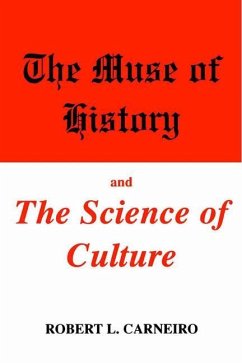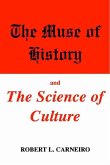Is history more than (in Boswell's words) a `chronological series of remarkable events'? Does it have a pattern? Is it fraught with `meaning'? Can we discern its trends? What determines its course? In short, can a substantial and coherent philosophy of history be devised that offers answers to these questions? These issues, which have intrigued -and bedeviled - historians for centuries, are explored in this thoughtful book.
Hinweis: Dieser Artikel kann nur an eine deutsche Lieferadresse ausgeliefert werden.
Hinweis: Dieser Artikel kann nur an eine deutsche Lieferadresse ausgeliefert werden.
'The Muse of History and the science of Culture is an engaging retrospective on Carneiro's most influential work. This is likely to be a book that is discovered and rediscovered for a long time. Carneiro's approach to anthropology is unabashedly scientific and he should be respected for his steadfastness in a discipline that blows hot and cold with each new wind.' -- American Antiquity, 66:4 (2001)
'[...]Carneiro deserves praise for dealing with one of the most important questions in both social science and history. This book will have the affect of helping social scientist and scholars more self-consciously examine their assumptions regarding the nature of history and the role the social sciences and the humanities in historical investigations.' -- Journal of the History of the Behavioral Sciences, 37:3 (2001)
'[...] the range of authorities cited makes the book a fascinating read. [...]the polemics themselves, and the thoughtful development of the literature, makes this book a useful source, and the author's infectious enthusiasm for his project should be widely emulated.' -- Science and Society, 66 (2002)
'[...]Carneiro deserves praise for dealing with one of the most important questions in both social science and history. This book will have the affect of helping social scientist and scholars more self-consciously examine their assumptions regarding the nature of history and the role the social sciences and the humanities in historical investigations.' -- Journal of the History of the Behavioral Sciences, 37:3 (2001)
'[...] the range of authorities cited makes the book a fascinating read. [...]the polemics themselves, and the thoughtful development of the literature, makes this book a useful source, and the author's infectious enthusiasm for his project should be widely emulated.' -- Science and Society, 66 (2002)
`The Muse of History and the science of Culture is an engaging retrospective on Carneiro's most influential work. This is likely to be a book that is discovered and rediscovered for a long time. Carneiro's approach to anthropology is unabashedly scientific and he should be respected for his steadfastness in a discipline that blows hot and cold with each new wind.'
American Antiquity, 66:4 (2001)
`[...]Carneiro deserves praise for dealing with one of the most important questions in both social science and history. This book will have the affect of helping social scientist and scholars more self-consciously examine their assumptions regarding the nature of history and the role the social sciences and the humanities in historical investigations.'
Journal of the History of the Behavioral Sciences, 37:3 (2001)
'[...] the range of authorities cited makes the book a fascinating read. [...]the polemics themselves, and the thoughtful development of theliterature, makes this book a useful source, and the author's infectious enthusiasm for his project should be widely emulated.'
Science and Society, 66 (2002)
American Antiquity, 66:4 (2001)
`[...]Carneiro deserves praise for dealing with one of the most important questions in both social science and history. This book will have the affect of helping social scientist and scholars more self-consciously examine their assumptions regarding the nature of history and the role the social sciences and the humanities in historical investigations.'
Journal of the History of the Behavioral Sciences, 37:3 (2001)
'[...] the range of authorities cited makes the book a fascinating read. [...]the polemics themselves, and the thoughtful development of theliterature, makes this book a useful source, and the author's infectious enthusiasm for his project should be widely emulated.'
Science and Society, 66 (2002)
`The Muse of History and the science of Culture is an engaging retrospective on Carneiro's most influential work. This is likely to be a book that is discovered and rediscovered for a long time. Carneiro's approach to anthropology is unabashedly scientific and he should be respected for his steadfastness in a discipline that blows hot and cold with each new wind.'
American Antiquity, 66:4 (2001)
`[...]Carneiro deserves praise for dealing with one of the most important questions in both social science and history. This book will have the affect of helping social scientist and scholars more self-consciously examine their assumptions regarding the nature of history and the role the social sciences and the humanities in historical investigations.'
Journal of the History of the Behavioral Sciences, 37:3 (2001)
'[...] the range of authorities cited makes the book a fascinating read. [...]the polemics themselves, and the thoughtful development of the literature, makes this book a useful source, and the author's infectious enthusiasm for his project should be widely emulated.'
Science and Society, 66 (2002)
American Antiquity, 66:4 (2001)
`[...]Carneiro deserves praise for dealing with one of the most important questions in both social science and history. This book will have the affect of helping social scientist and scholars more self-consciously examine their assumptions regarding the nature of history and the role the social sciences and the humanities in historical investigations.'
Journal of the History of the Behavioral Sciences, 37:3 (2001)
'[...] the range of authorities cited makes the book a fascinating read. [...]the polemics themselves, and the thoughtful development of the literature, makes this book a useful source, and the author's infectious enthusiasm for his project should be widely emulated.'
Science and Society, 66 (2002)








